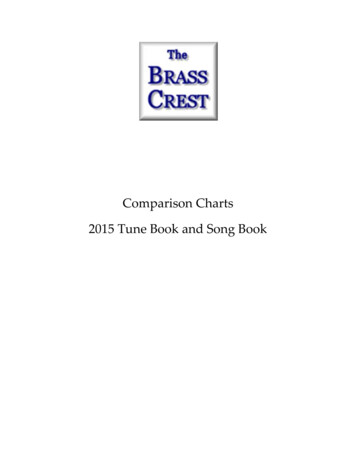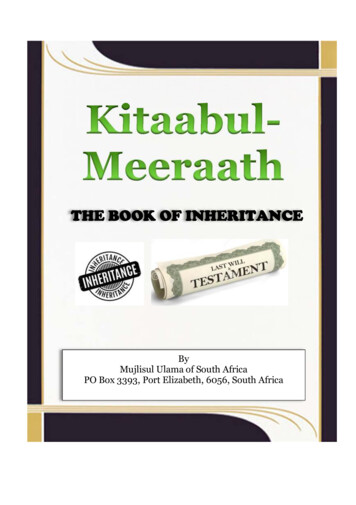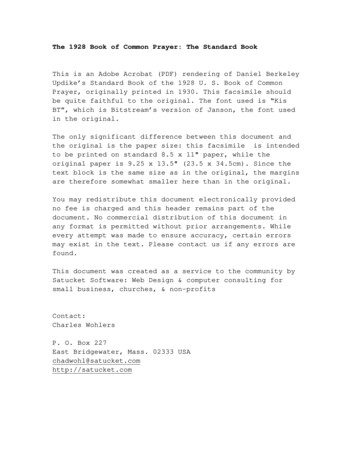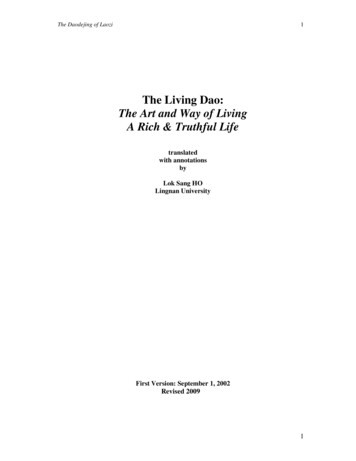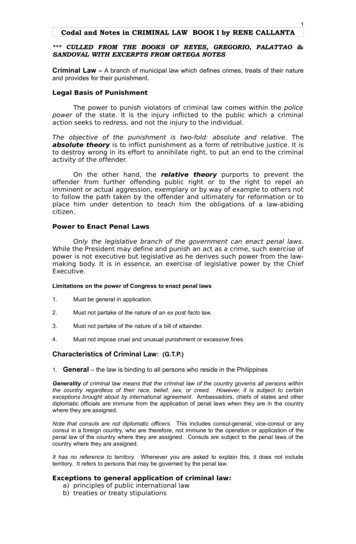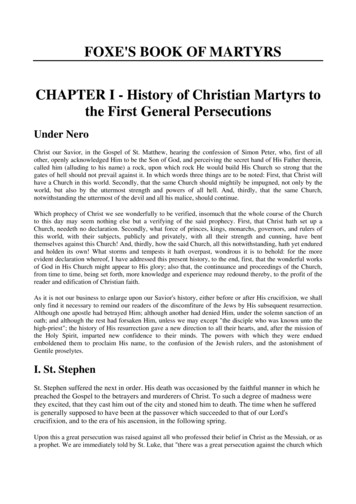
Transcription
FOXE'S BOOK OF MARTYRSCHAPTER I - History of Christian Martyrs tothe First General PersecutionsUnder NeroChrist our Savior, in the Gospel of St. Matthew, hearing the confession of Simon Peter, who, first of allother, openly acknowledged Him to be the Son of God, and perceiving the secret hand of His Father therein,called him (alluding to his name) a rock, upon which rock He would build His Church so strong that thegates of hell should not prevail against it. In which words three things are to be noted: First, that Christ willhave a Church in this world. Secondly, that the same Church should mightily be impugned, not only by theworld, but also by the uttermost strength and powers of all hell. And, thirdly, that the same Church,notwithstanding the uttermost of the devil and all his malice, should continue.Which prophecy of Christ we see wonderfully to be verified, insomuch that the whole course of the Churchto this day may seem nothing else but a verifying of the said prophecy. First, that Christ hath set up aChurch, needeth no declaration. Secondly, what force of princes, kings, monarchs, governors, and rulers ofthis world, with their subjects, publicly and privately, with all their strength and cunning, have bentthemselves against this Church! And, thirdly, how the said Church, all this notwithstanding, hath yet enduredand holden its own! What storms and tempests it hath overpast, wondrous it is to behold: for the moreevident declaration whereof, I have addressed this present history, to the end, first, that the wonderful worksof God in His Church might appear to His glory; also that, the continuance and proceedings of the Church,from time to time, being set forth, more knowledge and experience may redound thereby, to the profit of thereader and edification of Christian faith.As it is not our business to enlarge upon our Savior's history, either before or after His crucifixion, we shallonly find it necessary to remind our readers of the discomfiture of the Jews by His subsequent resurrection.Although one apostle had betrayed Him; although another had denied Him, under the solemn sanction of anoath; and although the rest had forsaken Him, unless we may except "the disciple who was known unto thehigh-priest"; the history of His resurrection gave a new direction to all their hearts, and, after the mission ofthe Holy Spirit, imparted new confidence to their minds. The powers with which they were enduedemboldened them to proclaim His name, to the confusion of the Jewish rulers, and the astonishment ofGentile proselytes.I. St. StephenSt. Stephen suffered the next in order. His death was occasioned by the faithful manner in which hepreached the Gospel to the betrayers and murderers of Christ. To such a degree of madness werethey excited, that they cast him out of the city and stoned him to death. The time when he sufferedis generally supposed to have been at the passover which succeeded to that of our Lord'scrucifixion, and to the era of his ascension, in the following spring.Upon this a great persecution was raised against all who professed their belief in Christ as the Messiah, or asa prophet. We are immediately told by St. Luke, that "there was a great persecution against the church which
was at Jerusalem;" and that "they were all scattered abroad throughout the regions of Judaea and Samaria,except the apostles."About two thousand Christians, with Nicanor, one of the seven deacons, suffered martyrdom during the"persecution that arose about Stephen."II. James the GreatThe next martyr we meet with, according to St. Luke, in the History of the Apsotles' Acts, wasJames the son of Zebedee, the elder brother of John, and a relative of our Lord; for his motherSalome was cousin-german to the Virgin Mary. It was not until ten years after the death of Stephenthat the second martyrdom took place; for no sooner had Herod Agrippa been appointed governorof Judea, than, with a view to ingratiate himself with them, he raised a sharp persecution against theChristians, and determined to make an effectual blow, by striking at their leaders. The accountgiven us by an eminent primitive writer, Clemens Alexandrinus, ought not to be overlooked; that, asJames was led to the place of martyrdom, his accuser was brought to repent of his conduct by theapostle's extraordinary courage and undauntedness, and fell down at his feet to request his pardon,professing himself a Christian, and resolving that James should not receive the crown of martyrdomalone. Hence they were both beheaded at the same time. Thus did the first apostolic martyrcheerfully and resolutely receive that cup, which he had told our Savior he was ready to drink.Timon and Parmenas suffered martyrdom about the same time; the one at Philippi, and the other inMacedonia. These events took place A.D. 44.III. PhilipWas born at Bethsaida, in Galilee and was first called by the name of "disciple." He laboreddiligently in Upper Asia, and suffered martyrdom at Heliopolis, in Phrygia. He was scourged,thrown into prison, and afterwards crucified, A.D. 54.IV. MatthewWhose occupation was that of a toll-gatherer, was born at Nazareth. He wrote his gospel in Hebrew,which was afterwards translated into Greek by James the Less. The scene of his labors was Parthia,and Ethiopia, in which latter country he suffered martyrdom, being slain with a halberd in the cityof Nadabah, A.D. 60.V. James the LessIs supposed by some to have been the brother of our Lord, by a former wife of Joseph. This is very doubtful,and accords too much with the Catholic superstition, that Mary never had any other children except ourSavior. He was elected to the oversight of the churches of Jerusalem; and was the author of the Epistleascribed to James in the sacred canon. At the age of ninety-four he was beat and stoned by the Jews; andfinally had his brains dashed out with a fuller's club.VI. MatthiasOf whom less is known than of most of the other disciples, was elected to fill the vacant place of Judas. Hewas stoned at Jerusalem and then beheaded.
VII. AndrewWas the brother of Peter. He preached the gospel to many Asiatic nations; but on his arrival at Edessa he wastaken and crucified on a cross, the two ends of which were fixed transversely in the ground. Hence thederivation of the term, St. Andrew's Cross.VIII. St. MarkWas born of Jewish parents of the tribe of Levi. He is supposed to have been converted to Christianity byPeter, whom he served as an amanuensis, and under whose inspection he wrote his Gospel in the Greeklanguage. Mark was dragged to pieces by the people of Alexandria, at the great solemnity of Serapis theiridol, ending his life under their merciless hands.IX. PeterAmong many other saints, the blessed apostle Peter was condemned to death, and crucified, as some dowrite, at Rome; albeit some others, and not without cause, do doubt thereof. Hegesippus saith that Nerosought matter against Peter to put him to death; which, when the people perceived, they entreated Peter withmuch ado that he would fly the city. Peter, through their importunity at length persuaded, prepared himself toavoid. But, coming to the gate, he saw the Lord Christ come to meet him, to whom he, worshipping, said,"Lord, whither dost Thou go?" To whom He answered and said, "I am come again to be crucified." By this,Peter, perceiving his suffering to be understood, returned into the city. Jerome saith that he was crucified, hishead being down and his feet upward, himself so requiring, because he was (he said) unworthy to becrucified after the same form and manner as the Lord was.X. PaulPaul, the apostle, who before was called Saul, after his great travail and unspeakable labors inpromoting the Gospel of Christ, suffered also in this first persecution under Nero. Abdias, declareththat under his execution Nero sent two of his esquires, Ferega and Parthemius, to bring him word ofhis death. They, coming to Paul instructing the people, desired him to pray for them, that they mightbelieve; who told them that shortly after they should believe and be baptised at His sepulcher. Thisdone, the soldiers came and led him out of the city to the place of execution, where he, after hisprayers made, gave his neck to the sword.XI. JudeThe brother of James, was commonly called Thaddeus. He was crucified at Edessa, A.D. 72.XII. BartholomewPreached in several countries, and having translated the Gospel of Matthew into the language ofIndia, he propagated it in that country. He was at length cruelly beaten and then crucified by theimpatient idolaters.XIII. Thomas
Called Didymus, preached the Gospel in Parthia and India, where exciting the rage of the paganpriests, he was martyred by being thrust through with a spear.XIV. LukeThe evangelist, was the author of the Gospel which goes under his name. He travelled with Paul throughvarious countries, and is supposed to have been hanged on an olive tree, by the idolatrous priests of Greece.XV. SimonSurnamed Zelotes, preached the Gospel in Mauritania, Africa, and even in Britain, in which lattercountry he was crucified, A.D. 74.XVI. JohnThe "beloved disciple," was brother to James the Great. The churches of Smyrna, Pergamos, Sardis,Philadelphia, Laodicea, and Thyatira, were founded by him. From Ephesus he was ordered to besent to Rome, where it is affirmed he was cast into a cauldron of boiling oil. He escaped by miracle,without injury. Domitian afterwards banished him to the Isle of Patmos, where he wrote the Book ofRevelation. Nerva, the successor of Domitian, recalled him. He was the only apostle who escaped aviolent death.XVII. BarnabasWas of Cyprus, but of Jewish descent, his death is supposed to have taken place about A.D. 73.And yet, notwithstanding all these continual persecutions and horrible punishments, the Church dailyincreased, deeply rooted in the doctrine of the apostles and of men apostolical, and watered plentously withthe blood of saints.
CHAPTER II - The Ten PrimitivePersecutionsThe First Persecution, Under Nero, A.D. 67The first persecution of the Church took place in the year 67, under Nero, the sixth emperor of Rome. Thismonarch reigned for the space of five years, with tolerable credit to himself, but then gave way to thegreatest extravagancy of temper, and to the most atrocious barbarities. Among other diabolical whims, heordered that the city of Rome should be set on fire, which order was executed by his officers, guards, andservants. While the imperial city was in flames, he went up to the tower of Macaenas, played upon his harp,sung the song of the burning of Troy, and openly declared that 'he wished the ruin of all things before hisdeath.' Besides the noble pile, called the Circus, many other palaces and houses were consumed; severalthousands perished in the flames, were smothered in the smoke, or buried beneath the ruins.This dreadful conflagration continued nine days; when Nero, finding that his conduct was greatly blamed,and a severe odium cast upon him, determined to lay the whole upon the Christians, at once to excusehimself, and have an opportunity of glutting his sight with new cruelties. This was the occasion of the firstpersecution; and the barbarities exercised on the Christians were such as even excited the commiseration ofthe Romans themselves. Nero even refined upon cruelty, and contrived all manner of punishments for theChristians that the most infernal imagination could design. In particular, he had some sewed up in skins ofwild beasts, and then worried by dogs until they expired; and others dressed in shirts made stiff with wax,fixed to axletrees, and set on fire in his gardens, in order to illuminate them. This persecution was generalthroughout the whole Roman Empire; but it rather increased than diminished the spirit of Christianity. In thecourse of it, St. Paul and St. Peter were martyred.To their names may be added, Erastus, chamberlain of Corinth; Aristarchus, the Macedonian, andTrophimus, an Ephesians, converted by St. Paul, and fellow-laborer with him, Joseph, commonly calledBarsabas, and Ananias, bishop of Damascus; each of the Seventy.The Second Persecution, Under Domitian, A.D. 81The emperor Domitian, who was naturally inclined to cruelty, first slew his brother, and then raised thesecond persecution against the Christians. In his rage he put to death some of the Roman senators, somethrough malice; and others to confiscate their estates. He then commanded all the lineage of David be put todeath.Among the numerous martyrs that suffered during this persecution was Simeon, bishop of Jerusalem, whowas crucified; and St. John, who was boiled in oil, and afterward banished to Patmos. Flavia, the daughter ofa Roman senator, was likewise banished to Pontus; and a law was made, "That no Christian, once broughtbefore the tribunal, should be exempted from punishment without renouncing his religion."A variety of fabricated tales were, during this reign, composed in order to injure the Christians. Such was theinfatuation of the pagans, that, if famine, pestilence, or earthquakes afflicted any of the Roman provinces, itwas laid upon the Christians. These persecutions among the Christians increased the number of informersand many, for the sake of gain, swore away the lives of the innocent.Another hardship was, that, when any Christians were brought before the magistrates, a test oath wasproposed, when, if they refused to take it, death was pronounced against them; and if they confessedthemselves Christians, the sentence was the same.
The following were the most remarkable among the numerous martyrs who suffered during this persecution.Dionysius, the Areopagite, was an Athenian by birth, and educated in all the useful and ornamental literatureof Greece. He then travelled to Egypt to study astronomy, and made very particular observations on the greatand supernatural eclipse, which happened at the time of our Savior's crucifixion.The sanctity of his conversation and the purity of his m
Thomas . Called Didymus, preached the Gospel in Parthia and India, where exciting the rage of the pagan priests, he was martyred by being thrust through with a spear. XIV. Luke The evangelist, was the author of the Gospel which goes under his name. He travelled with Paul through various countries, and is supposed to have been hanged on an olive tree, by the idolatrous priests of Greece. XV .
